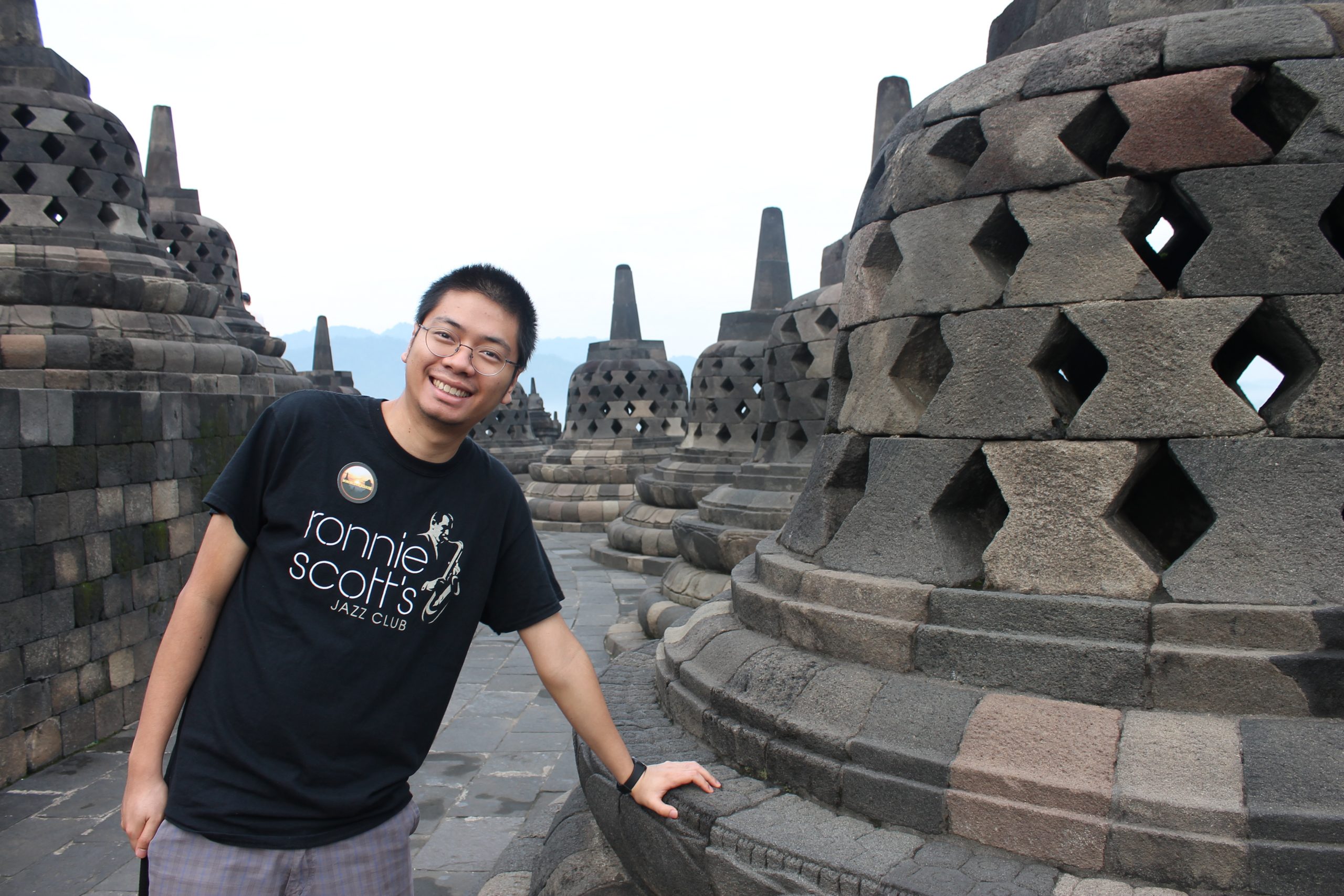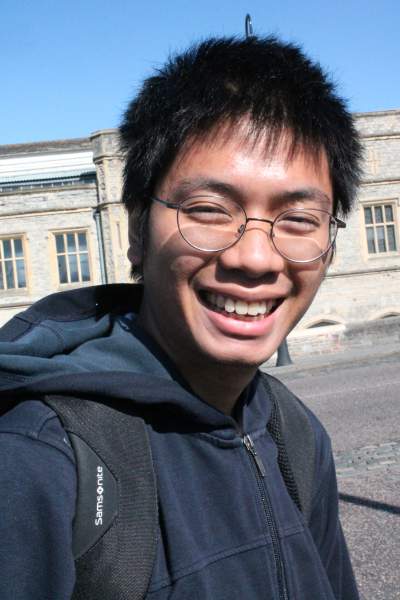
Vincentius Aji Jatikusumo on his journey to Cambridge and a PhD investigating the process of DNA synthesis.
Gates Cambridge and my time at Cambridge have taught me a lot. I hope it will inspire many other outstanding Indonesian students to dream bigger and to be more global.
Vincentius Aji Jatikusumo
Vincentius Aji Jatikusumo likes asking questions. At school there was never time for the teacher to answer them all, but as a PhD student he has complete freedom to ask as many questions as he wants. Indeed, academic research is about asking questions and asking the right questions is what leads to progress.
Vincentius’ research focuses on a fundamental question – how life happens. He studies the process of DNA synthesis and seeks to understand the molecular machinery of eukaryotic DNA replication. “It’s a fundamental scientific question. Without replication cells will not be able to survive and propagate, but there is so much we don’t know about it,” he says. He approaches this through the structure of biology. “My research is focused on understanding DNA synthesis, how it begins, and trying to understand the architecture of the system. There are exciting developments happening in this area, especially with the development of cryo-electron microscope (cryo-EM), and Cambridge is an exciting place to be with access to amazing facilities and experts.”
Curiosity
Vincentius [2015] was born in Surabaya in Indonesia and spent his first six years there. As his parents were doctors, the family moved around – from Surabaya to Madiun to Batam. His father is a gynaecologist and his mothers is an ear, nose and throat doctor. Medicine runs in the family. Vincentius’ maternal grandmother was a nurse. She died before he was born, but on her deathbed she told Vincentius' mother to use the money the family would save on her care to educate their children. He and his sister therefore grew up with an understanding of the importance of education. "Although I have never met my grandmother, her presence was very strong. She has been a big inspiration to me."
Although his parents talked a lot about their work at the dinner table and were keen for him to succeed at school, Vincentius says they did not expect him to follow in their footsteps and do medicine. Nor did they focus heavily on his grades. Instead they took a broad view of his education. “What struck me from hearing about their work was that in order to make other people happy you have to make yourself happy and that there are many ways to make people happy,” says Vincentius. “The important thing for my parents was to do your best and be kind.”
Vincentius was a curious child, always wanting to know why things are the way they are. He read avidly, learning to read before he attended kindergarten, and would pick up random books just to learn about different subjects or viewpoints. He says the ability to understand opposing views is vital as a scientist and scholar.
Vincentius was also interested in writing and wrote his first article – on football – at 10 and sent it to a national newspaper where it was published.
He attended junior high school in the city of Batam and at 15 he realised he wanted to go to university in the UK. “I was inspired by the great scientists such as Darwin and Newton who have come from the UK,” he says. He told his father who said it would be very difficult to get into a UK university from Indonesia because of its different education system. He advised Vincentius to plan ahead and do his research. He discovered that his father was right and that Indonesian qualifications would not be accepted at UK universities. Singapore was an hour away by ferry and Singapore qualifications were recognised in the UK. His parents decided they could pay to send Vincentius there to do his A Levels.
He stayed with a guardian in Singapore for four years while he attended high school. It was hard work – he says the Singapore system is very demanding and he was taught wholly in English. It was worth it, however, because it paved the way to his dream of studying in the UK. “It would not have happened if it wasn’t for the support of my parents,” he says.
Vincentius describes himself modestly as an average student, although one who was passionate about maths and science and loved learning. Other interests include reading, jazz music and football.
Genetics
He applied to several UK universities, all of them towns with good football teams, and was very happy to be accepted to Newcastle University which has an excellent reputation for genetics. Being someone who is interested in how things work, Vincentius wanted to explore DNA inheritance and how the study of genetics has evolved. In Indonesia, he says, the subject is a fairly new one. “Studying genetics in Newcastle was a culture and science shock,” he says. “In Indonesia doctors don’t tend to ask why their patients have certain diseases, let alone asking about their genetic predisposition to it. Genetics opens up new questions.”
In his undergraduate's final year Vincentius had to do a research project and he chose to study crystallography, the experimental science of determining the arrangement of atoms in crystalline solids, to understand more about the process of cell division. He ended up in Dr Owen Davies’ laboratory where he managed to define novel interactions between two synaptonemal complex proteins.
From this taste of research, he knew that he wanted to pursue his studies on graduation and Cambridge University was the obvious place to apply. Vincentius had spent his second year summer vacation studying the genome editing system CRISPR/Cas9 at Cambridge as an Amgen scholar and been very impressed by the university. Researching Professor Luca Pellegrini’s laboratory in the Department of Biochemistry, he realised that one of the publications linked to it was written by Dr Owen Davies who had done his post-doctorate at Cambridge. It seemed like serendipity.
Vincentius is now entering the final year of his PhD and says, using biochemical and biophysical data, his research has provided some clues about how DNA synthesis is being initiated in humans. “What is missing is an understanding of the architecture of the protein system, which would then provide a more complete picture,” he says. “If we know what happens when everything is going right, we could understand a lot of genetic diseases. As we progress there are more and more questions to be answered. At my Gates Cambridge interview I didn’t promise we would be able to cure cancer. I only know that there are more interesting questions to answer, which can help us to understand the human biological system better. That’s what keeps me going.”
He is not sure whether he will stay in academia after he completes his PhD, but he hopes to continue in science and to keep asking questions. "Gates Cambridge and my time at Cambridge have taught me a lot. I hope it will inspire many other outstanding Indonesian students to dream bigger and to be more global. My path was not necessarily straightforward, but I hope more bright Indonesian students will apply and come here. To study at Cambridge is an important step towards developing and fulfilling students' academic potential."
He adds: "The wonderful thing is that this is not the end for me, but the beginning of something bigger. I am excited by what lies ahead and hopefully I can contribute more to helping the people around me and back home in Indonesia."

Vincentius Aji Jatikusumo
- Alumni
- Indonesia
- 2015 PhD Biochemistry
- Peterhouse
I am pretty much a journeyman: born in Surabaya, spent my childhood in Madiun, grew up in Batam, completed my high school in Singapore, and studied BSc (Hons) Biomedical Genetics in Newcastle. Along the way, my curiosity for many things has been growing, ever since my parents encouraged me to read a lot: from national newspaper, Tintin series, to literature.During my undergraduate years, I developed strong interest in molecular biology. I was the first Indonesian to be selected by the Amgen Scholars Programme in Cambridge, to pursue a summer research on CRISPR/Cas9 modification. My undergraduate project at Newcastle University, where I managed to define novel interactions between two synaptonemal complex proteins, motivated me even more to embark on a research career.I will work with Dr. Luca Pellegrini at the Department of Biochemistry to investigate the molecular machinery of eukaryotic DNA replication. This may help us to give much-needed details on the fundamental process of genomic duplication and clues on how some genetic diseases arise.I am striving to be a leading scientist who is well-motivated to help the others. My biggest goal is to help my home nation Indonesia. It is a huge country with so many potentials – and I hope to lead and to contribute in the field of medical research.
Previous Education
University of Newcastle Upon Tyne












